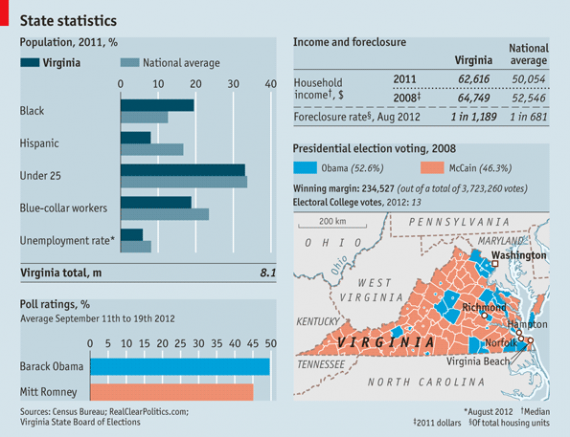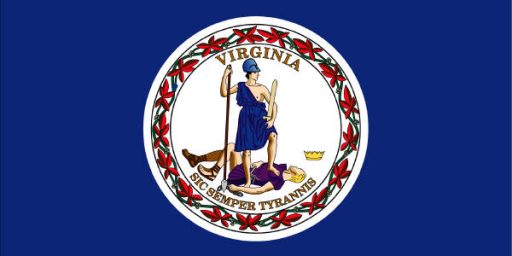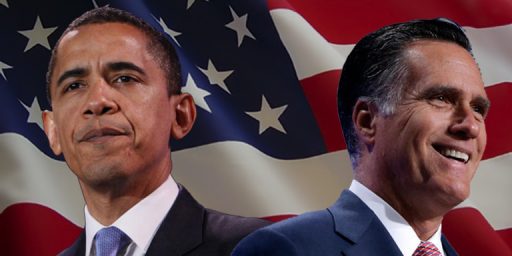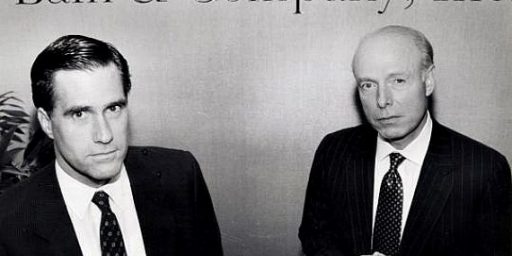How Virginia Went From Red To Purple
Virginia went Republican in every presidential contest from 1968 to 2004. It's likely to vote for Barack Obama again five weeks from now.
Over the weekend, The Economist explored why Virginia, long among the reddest of the red states, has suddenly become ripe for Democrats. The answer is found in my neck of the woods:
“NORTHERN VIRGINIA,” bellowed Mitt Romney at a packed outdoor rally in the region earlier this month, “could well determine who the next president is.” He was not exaggerating. The outer suburbs of Washington, DC, are the most populous and independent-minded part of the state. They plumped for Barack Obama in 2008, helping to turn Virginia Democratic in a presidential election for the first time since 1964. The state, in turn, proved the tipping point for Mr Obama on election night: as soon as the results from Virginia were in the prognosticators called the election for him. Much the same will apply this time round: it will be hard for Mitt Romney to win the presidency without clinching Virginia.
[…]
Virginia’s politics have changed because its demography has. Almost half the population was born outside the state (including more than a tenth born abroad), and so does not necessarily share the Southern sensibilities of the natives. The tobacco-growing, coal-mining former mainstay of the Confederacy lives on only in the state’s southern and western reaches. These areas—bar a few college towns and black-majority counties—are solidly red at the presidential level.
But the most conservative parts of the state are sparsely populated, and have relatively low turnout. The bulk of the population lives in a crescent that stretches from the outskirts of Washington to the coast via Richmond, the state capital. These areas are much more politically volatile. They include a few Democratic-leaning spots—some Washington suburbs, and the cities of Richmond, Norfolk and Hampton—as well as the main swing counties: Loudoun and Prince William near Washington, Henrico outside Richmond and Chesapeake near the coast.
[…]
They are home to the Pentagon, in Arlington County, and America’s biggest naval base, in Norfolk, along with their many contractors and service industries. Other federal agencies and workers spill over from Washington. Coastal towns like Virginia Beach attract lots of tourists. According to Mr McDonnell, the state also boasts more tech jobs, relative to its population, than any other bar California. Its biggest export is computer chips.
It would be nearly impossible for Romney to win the White House without Virginia and it’s inconceivable to me that he’ll win Ohio and lose Virginia. Indeed, he’s likely to lose both.
Northern Virginia is an odd creature because so much of its enormous wealth derives from the fact that the seat of government is nearby. But it attracts an enormous amount of highly educated talent from around the country and, indeed, around the world.
Like the county-by-county maps of the United States as a whole that became popular after the 2000 election, looking at a map of Virginia such as the one atop the page here is grossly misleading. Geographically, Virginia—like the country as a whole—is overwhelmingly Republican. But the population is increasingly clustered in a handful of major metropolitan areas and these are almost all turned off by a GOP message that’s aimed at a rural base.







Correct. But as you point out, look at things solely based on geography fails to account for population. It’s important to remember how sparsely populated, realtively speaking, large swaths of the United States are. And that can significantly skew our understanding of party affiliation within the country.
This was graphically highlighted in some of the cartograms created in the aftermath of the 2008 elections:
http://www-personal.umich.edu/~mejn/election/2008/
Virinia like the US shows that voting patterns are more of a rural/urban pattern than anything else.
The tension isn’t really red or blue states, but urban vs rural.
Well, there’s not a lot that can be done. Like many of the 47%, the outer-beltway leaches know where their bread is buttered. For them, corrupt crony government is a boon. A smaller government with trimmed regulations is anathema. On one side or the other, big, overweening government is their stock in trade, either by lobbying or contracting or by virtue of their government job.
@JKB
Curious where your oozing contempt come from. My mother & mother in law are part of the 47%. Both worked hard, raised families, paid taxes, and played by the rules their whole lives. My mother in law is 79, and she still works.
The Republicans lost the urban vote a long time ago. The story here may be suburbs. No party can afford to be just a rural party since only 20% of Americans live there. The GOP seems to have lost lots of ground in suburbs where its social agenda doesn’t play well like northern VA, eastern Penn., Orange County (I wonder if Obama will be the first to carry it since FDR). Presumably they are doing much better in suburbs of Dallas etc.
Around DC, the further out you go, GOP vote goes up. Loudoun more GOP than Fairfax which is more GOP than Arlington. Is that true elsewhere?
I love that the 47% meme has finally been exposed to the light of day. That’s how well-off conservatives really talk, amongst themselves. I know. I have family…
Keep banging that 47% leech drum, JKB. As loudly as you can. Please.
@anjin-san: Add in the fact that most of these people he’s complaining about (contractors, federal employees) themselves pay state / district taxes, federal income taxes, sales taxes, property taxes, excise taxes, etc., and also are the ones that keep local contractors, restaurant workers, and small business owners going. It is not only contempuous, but short-sighted stupidity.
It’s as simple as demographics. Virginia has a much higher than average percentage of blacks. That alone tells nearly the full story. After all, nobody would have confused John Kerry with a black dude. And although Bill Clinton was the “first black president,” in the eyes of the loopy media and elements of the spaced out chattering classes, there was visual evidence to the contrary. Virginia also has a high median income and a large percentage of federal government workers. Then to top it off it’s a state with a lot of colleges and universities. 1+1+1+1 = 4.
@JKB:
Note that when one looks at *facts* your shoddy reasoning, as usual, falls apart. The fact is that if the goal of those residents is the growth of government, then they are likely to be Republicans as Democrats. History demonstrates that government tends to increase in size under both parties (and quite frankly, more under Republicans).
Source:
http://www.forbes.com/sites/rickungar/2012/05/24/who-is-the-smallest-government-spender-since-eisenhower-would-you-believe-its-barack-obama/
@Tsar Nicholas:
The phrase “much higher percentage” is simply not true when it comes to African-Americans in Virginia.
According to the 2010 Census, the African Americans constituted 12.6% of the US population and 19.8% of Virginia’s population. Larger? Yes, but not substantially so. Especially when you compare it with Alabama (26.2% African American) and Mississippi (more than 36% African American). Last time I checked, those were solid red states.
The reasons Virginia has gone “purple” are precisely those James notes in his post.
@JKB:
Awesome post! It’s a perfect parody of stupid talking points strung together.
Well done, it’s a real shame you actually might believe it.
nightrider‘s right to focus on the urban vs suburban/rural split. The suburbs are hurting. GOP policies w/r/t more taxation but fewer suburban services is turning off a lot of voters where those voters actually see the effects locally, where it’s implemented at the state level already. The effect is probably greater in a place like Florida where the tea party controls both houses of the legislature and the governor’s office, and the policies are definitely not popular.
@JKB:
You mean leeches like Romney, JKB? The man hasn’t had a job in years, pays very little in taxes (comparatively), and walks around acting like he is entitled to his vast riches.
You want to see leeches? Look at the Mitt Romneys of the world.
James wrote: “But the population is increasingly clustered in a handful of major metropolitan areas and these are almost all turned off by a GOP message that’s aimed at a rural base.”
Like Steven Taylor’s post from the other day, this correctly puts much of the blame on the party and not the candidate. Anyone who is capable of winning the GOP nomination is going to be stuck with a losing message.
James, I would be very interested in hearing your assessment as a Republican on what policies (vs. rhetoric) the GOP should advocate in order to win back the presidency. It seems apparent that all of the reasonable policy ground is now occupied by the Democratic party.
@Spartacus:
In this particular case, I think a more likeable, articulate candidate might be able to beat Obama with essentially the same policies. More generally, though, the GOP is in many ways hostage to the rhetoric of 1980.
The party is increasingly out of touch on the social issues, especially women’s issues. And it’s mostly a matter of rhetoric, in that the policy debates are largely over issues that don’t matter. The platform is also a decade out of step on gay issues.
I think the deficit messaging that the party has embraced since 2010 is a winning one. But it doesn’t work without a willingness to make reasonable, Reaganesque compromises on taxes.